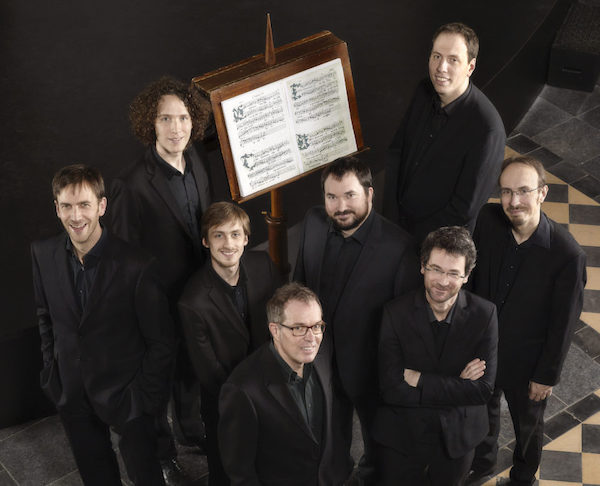Cappella Pratensis serves up a Dutch treat with epic Obrecht mass

Imagine opening the score of Beethoven’s Fifth to the first page and seeing not “Allegro con brio” but “Snel met kracht.”
That’s what might have happened if musicians from Europe’s Low Countries had dominated musical life in the 17th and 18th centuries the way they did in the 15th. Instead, Italians took over that role, and to this day musicians do their crescendos, pizzicatos, and dolcissimos in that language.
In 1487, by contrast, Duke Ercole d’Este of Ferrara bypassed his Italian countrymen in hopes of luring a Flemish master, Jacob Obrecht, to be his maestro di capella. The sweet yet complex sounds that captivated the duke, and music lovers across the continent, rang out again Sunday in Corpus Christi Church as Music Before 1800 presented the Netherlands-based vocal ensemble Cappella Pratensis in Obrecht’s monumental Missa Maria zart.
The duke’s wooing succeeded at last in 1504, but Obrecht’s service in Ferrara was brief, owing to the duke’s death later that year, soon followed by the composer’s own succumbing to the plague at age 47. Missa Maria zart is thought to be one of his last settings of the mass, overflowing with invention and expanding the genre from its usual half hour in performance to over an hour.
One can only imagine the rivalry that might have simmered between Obrecht’s highly-worked style and the more transparent one of his great contemporary Josquin Desprez. As it was, Josquin composed prolifically for 16 years after Obrecht’s death, putting his stamp on the era and consigning the Flemish master to obscurity for 400 years.
Happily, the eight members of Cappella Pratensis—singing, of course, “a capella” under the artistic direction of Stratton Bull—proved on Sunday that Obrecht’s music could be as alive and engaging for a 21st-century audience as the more familiar idioms of later eras. In fact, for listeners whose previous experience of Obrecht might have been a recording or two in a music history course, the living presence of the all-male ensemble singing continuously for 75 minutes with unwavering focus and imagination was an eye-opener.
Following historic practice, the singers performed not with individual scores, but gathered around a single large score on an oversize music stand, weaving their tight counterpoint at close quarters. On the side of the stand facing the audience, a second manuscript copy (handsomely penned by bass singer Marc Busnel) offered a visual correlative to the sounds of the concert.
An extra layer of authenticity was provided by the plainsong propers that, according to liturgical practice, were interleaved between the choral movements of the mass. The group sang these chants from facsimile pages of a choirbook compiled 500 years ago in ‘s-Hertogenbosch, the Netherlands, where Cappella Pretensis is based, near Obrecht’s home town of Ghent.
A decidedly non-liturgical, but very welcome, feature of the concert was its beginning and ending with a simple unison rendition of “Maria zart” (tender Mary), the popular German devotional song that became the cantus firmus of Obrecht’s mass.
Discerning, at a single hearing, how Obrecht processed this song by fragmentation, augmentation, retrograding and Lord knows what else would be beyond most listeners’ capacity, but it was good at least to have the tune in one’s memory as the work progressed.
Obrecht’s style is characterized by complex interweaving lines in a comparatively simple, diatonic harmonic scheme. Subtle variations in texture carry most of the expressive burden, with few pictorial effects other than a noticeable brightening on lines like “Et resurrexit” and “Deum de Deo, lumen de lumine.”
For listeners conditioned to the “thunderbolts” (as Mozart said) of Bach and Handel, Obrecht’s more inward-looking idiom may take some getting used to. On Sunday, it wasn’t long before the group’s committed performance unfolded this composer’s expression in all its variety.
Whether dipping low or reaching high, Sunday’s ensemble—Stratton Bull and Andrew Hallock, superius; Lior Leibovici and Korneel Van Neste, altus; Julian Podger and Peter van Heyghen, tenor; Marc Busnel and Grantley McDonald, bass–sang with decidedly masculine energy and resonance. No disembodied angels these.
Experts in the period may debate this or that point of style or technique, but as a musical-visual-historical introduction to Obrecht and his world, brought to New York straight from the source, Sunday’s performance would be hard to beat.
Music Before 1800 presents Emi Ferguson, flute and RUCKUS in “Fly the Coop,” a program of Bach sonatas and preludes, Nov. 17 at Corpus Christi Church. mb1800.org; 212-666-9266.